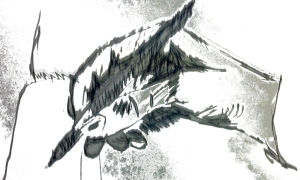I don’t know about you, but as for me – unless it is absolutely critical to the movement of a story – I don’t need to always know every item in each room, or the style and brand of every shoe in the protagonist’s closet… and I especially do not need to know about the mole on the back of the least minor character’s left ear.

Now, the genius of authors such as Balzac, Dickens, and Twain cannot be denied by me; however, I often find their attention to detail excessive and rather tedious for my overly sensitive reading sensibilities.
Especially Balzac.
I know, I know… It’s me not them.
But I’m the kind of reader dude** who enjoys employing as much as possible of my own personal image making machine, aka, my imagination, along with my thought processing gyrator, against a story’s plot, or lack thereof; and when it comes to a character and his or her physical appearance and personality traits, I prefer for them, through the details found in the story’s showing, to slowly emerge within that enveloping zen-like midst of verisimilitude (that I hopefully find myself in) until he or she can be seen standing clearly before my mind’s unblinking eye, fully developed and fleshed out.
So it should come as no surprise then when I tell all you other reader dudes*** that I try to write my stories in the way that I prefer to read them: with limited and only absolutely necessary descriptive telling.

For example, you will find that the book description for The Sea Trials of an Unfortunate Sailor reads in part:
Written with a narrative starkness, it leaves us with only our own prejudices and stereotypes to draw from and forces us to make assumptions about character and identity, and, in the end, determine not just who did it but if it was even done at all.
Admittedly, this book was written intentionally with a “narrative starkness,” not so much because starkly written books are the kind I like to read most, but because its starkness is used as a device to make a sad but painful point about the military’s failed and former Don’t Ask Don’t Tell policy.
I was navy Equal Opportunity Advisor during DADT’s salad days and the crux of my job at the time was to travel around the Western Pacific to facilitate training seminars and focus groups in an effort to educate sailors on how to legally administer and execute the confusing and harmful policy.
As you probably already know, prior to the implementation of DADT, homosexuals were prohibited from serving in the military. With DADT – which was a compromise between Bill Clinton, who wanted to allow homosexuals to serve with no restrictions, and the military’s top brass, who wanted to continue barring homosexuals from service – homosexuals were allowed to serve in the military… provided they did not discuss their sexual orientation with anyone nor have any homosexual relations whatsoever. Additionally, no service member was allowed to ask any other service member what his or her sexual orientation was… hence the infamous moniker don’t ask, don’t tell.
A pretty cruel policy, to say the least. However, it was rather cut and dry. Not so much confusion with it on the surface.
The problems that came about with the policy was a result of when service members started taking action based on their homophobic perceptions and stereotypes.
For instance, some sailors were harassed, abused, and, sadly, even killed because they were perceived to be a homosexual based on the way he or she talked, or walked, or, while in civilian attire, dressed.
And while that’s tragic in and of itself, additional problems were often caused when these illegally and harmfully harassed sailors attempted to tell their chains-of-command about the harassment and the COC, instead of seeing these attempts as pleas for help, saw them instead as admissions of homosexuality. As a result, many sailors were wrongfully kicked out of the navy because of the ignorance and bigotry of those who were supposed to protect them.
It was very distressing to me whenever I heard of any instance of it happening. However, it was highly rewarding for me whenever I had the opportunity to get in front of a group of senior leaders and help/make them see the light as to how to effectively execute and administer DADT and to warn them about the problems they could get into for wrongly processing a sailor out of the service.
While I am very happy that DADT was finally axed and homosexuals are now allowed serve without any restrictions to their being, it was all of that nasty DADT stuff that became the impetus for me writing my novel.
And my goal in writing it was to force the reader to have to apply his or her own values, via perceptions and stereotypes, upon the characters in and events of the story. Consequently, it was important for me as a writer to not tell the reader what I wanted them to think by way of character description, but to allow them to draw their own conclusions.
I hope the story does this effectively. I guess the results can be found in the book’s reviews.
Anyway…
I was reminded about all this the other day when I read an article by The Atlantic entitled “The Case Against Colorblind Casting.” It is a very well-written and informative piece about the challenges Hollywood has casting non-white actors and how “colorblind casting,” while admirable in its goals, is not a sustainable means to diversify the films we watch. The article highlights as an example, the recent success of Oscar Isaac, Hollywood’s current It and Everywhere Man, who, just so he would have a better chance at not being type-cast and at being able to land “ethnically flexible” roles, chose to drop his last name of Hernández.
Sure, performers have and probably always will “alter” their names to one that they feel is best received by their fans; however, having to do it just to appear “less ethnic,” reminds me of the movie “La Bamba,” where it shows how the singer Richard Valenzuela was compelled to assume the less ethnic-sounding stage name of Ritchie Valens so that he could better appeal to his white audience.
That was sixty years ago and I’m sad to report, as is evidenced by our latest Hollywood star Oscar Isaac, that it’s still happening.
Man, oh man***…
This equality stuff sure is a difficult nut to crack – witness the all-white Oscar nominees for this year’s Best and Supporting Actors/Actresses – and I’m not about to attempt to try and crack it here.
Except to say that screenwriters can certainly have a hand in keeping an open playing field for actors of all races and ethnicity by – you guessed it – laying off the descriptive details in their screenplays and leaving it up to the director to cast the best actor for the role based on the story’s content and need and not on the screenwriter’s biases.
Of course, a more diverse field of screenwriters would be most beneficial to making a crack in that nut…
You may not have noticed, but I am a very white dude**… pasty even. Even still, for what it’s worth, when I adapted my short story “Leave” into a screenplay, I wrote it so the only true limitations in casting should be because of gender – and there’s just no getting around it – there are distinct male and female roles that are critical to the story’s telling, as it is a story about the bigotry faced by the first women allowed to serve on navy combatant ships.
But as far as casting for the roles for the screenplay’s mostly bigoted and sexist male characters and a few exemplary female characters… race nor any other physical trait, apart from one that would prevent someone from being accepted into the military, should not matter to the director who will be doing the casting.
Now, I doubt my starkly written, diminutive screenplay will go far in the effort to crack Hollywood’s White Nut problem… but that’s all I got for now.
Still, I’m really looking forward to beginning the process of creating this film. And, while things are a long way from definite right now, you may just be surprised by the talented actors who already have expressed an interest in being part of the production.
I can’t wait until we reach the point where I can share it all with you.
Until then, as we say in the business…
Stay tuned!
*Yeah, I know “uncolorful” is not a real word, whatever a real word may be, but I it sounds less negative to me than “colorless” so, for what it’s worth, I’m going with it.
**gender specific
***non-gender specific








